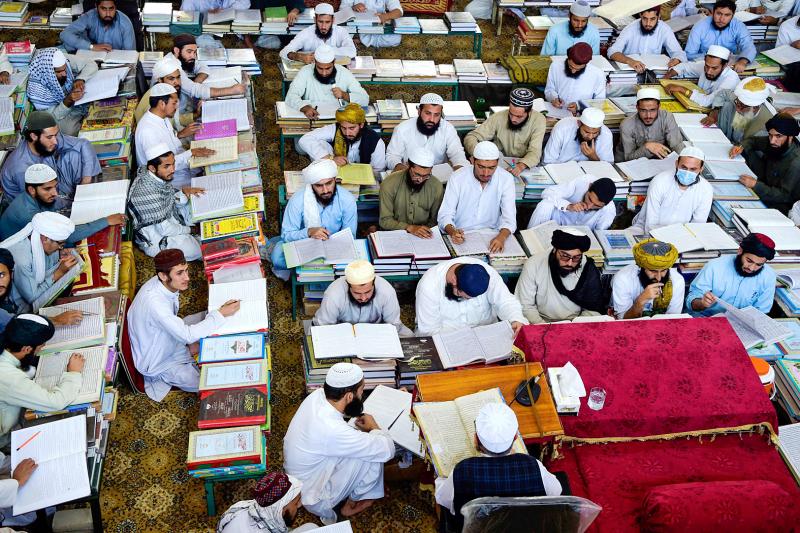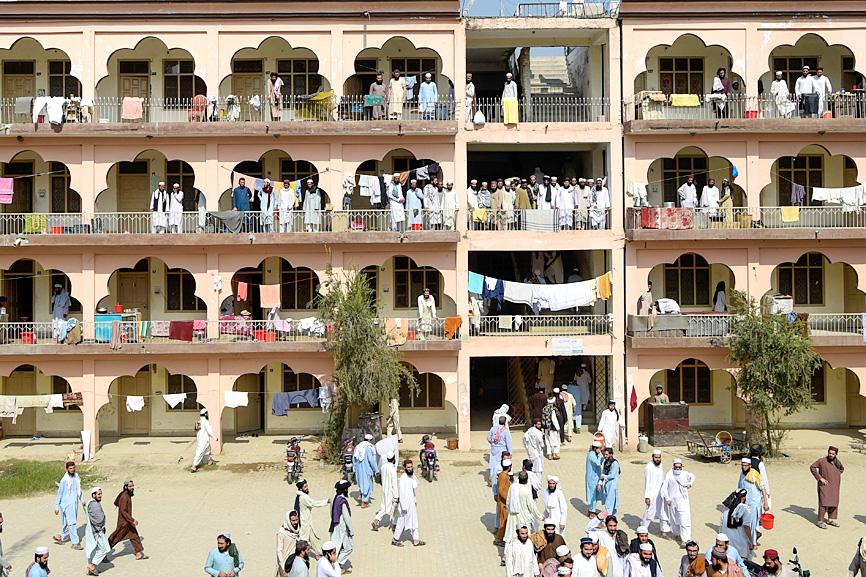Maulana Yousaf Shah cracks a wide smile as he rattles off a list of former students turned Taliban leaders, reveling in their victories over superpowers on Afghanistan’s battlefields after graduating from Pakistan’s “university of jihad.”
The Darul Uloom Haqqania seminary has churned out a who’s who of Taliban top brass — including many now on the hardline group’s negotiating team holding talks with the Kabul government to end a 20-year war.
“Russia was broken into pieces by the students and graduates of Darul Uloom Haqqania and America was also sent packing,” beamed Shah, an influential cleric at the seminary that critics have dubbed the “university of jihad.”

Photo: AFP
“We are proud,” he said.
The sprawling campus in Pakistan’s Akora Khattak, about 60km east of Peshawar, Pakistan, is home to about 4,000 students who are fed, clothed and educated for free.
It has sat at the crossroads of regional militant violence for years, educating many Pakistanis and Afghan refugees — some of whom returned home to wage war against the Russians and Americans or preach jihad.

Photo: AFP
Despite its infamy in some quarters, it has enjoyed state support in Pakistan, where mainstream political parties are heavily boosted by links with religious factions.
This month, Darul Uloom Haqqania’s leaders boasted of backing the Taliban insurgency in Afghanistan in a video posted online — outraging the Kabul government.
Seminaries like Haqqania “give birth to radical jihadism, produce Taliban and are threatening our country,” Afghan President Ashraf Ghani’s spokesman Sediq Sediqqi said, demanding their closure.
Afghanistan’s leaders argue that Pakistan’s approval for the madrasah is proof that it backs the Taliban.
Shah scoffed at the notion the madrasah encouraged violence, but he defended the right to target foreign troops.
“If someone armed enters your house and you are threatened ... then definitely you will raise a gun,” Shah said.
The seminary’s former leader, Sami-ul-Haq, boasted of advising the Taliban’s founder Mullah Omar — earning him the moniker “the father of the Taliban.”
Haq later sent students to fight for the movement when it issued a call to arms during its rise to power in the 1990s.
Some Pakistani extremists who later attacked their own country have also been linked to the seminary, including the suicide bomber who assassinated former Pakistani prime minister Benazir Bhutto.
“The Haqqania madrasah sits at the heart of one of the most important and influential hardline Sunni clerical networks,” analyst Michael Semple said. “There’s an expectation that large proportions of the Afghan graduates will move seamlessly into accepting positions of responsibility in [Taliban] structures.”
However, Semple dismissed notions the madrasah served as a “terrorist factory” where students received combat training or had a hand in militant groups’ strategic decisions.
Rather, like elite Western universities feeding new talent into corporate boardrooms and political parties, Haqqania’s contribution to insurgencies rests in the bonds forged in its classrooms.
Graduates insisted they received no military training at Haqqania and were not obliged to join the fight in Afghanistan, but admitted jihad was discussed openly, including in “special lectures” by Afghan instructors.
“Any student who wanted to go for jihad could go during his vacations,” said cleric Sardar Ali Haqqani, who graduated from the seminary in 2009.
Pakistani Prime Minister Imran Khan’s party has also lavished the seminary with millions of dollars in return for its political support.
Madrasahshave long served as vital lifelines for millions of impoverished children in Pakistan and Afghanistan, where social services are chronically underfunded.
Even Pakistan’s military — which has been accused of supporting the Taliban — has said that madrasahs have injected further uncertainty into the region.

Nauru has started selling passports to fund climate action, but is so far struggling to attract new citizens to the low-lying, largely barren island in the Pacific Ocean. Nauru, one of the world’s smallest nations, has a novel plan to fund its fight against climate change by selling so-called “Golden Passports.” Selling for US$105,000 each, Nauru plans to drum up more than US$5 million in the first year of the “climate resilience citizenship” program. Almost six months after the scheme opened in February, Nauru has so far approved just six applications — covering two families and four individuals. Despite the slow start —

YELLOW SHIRTS: Many protesters were associated with pro-royalist groups that had previously supported the ouster of Paetongtarn’s father, Thaksin, in 2006 Protesters rallied on Saturday in the Thai capital to demand the resignation of court-suspended Thai Prime Minister Paetongtarn Shinawatra and in support of the armed forces following a violent border dispute with Cambodia that killed more than three dozen people and displaced more than 260,000. Gathered at Bangkok’s Victory Monument despite soaring temperatures, many sang patriotic songs and listened to speeches denouncing Paetongtarn and her father, former Thai prime minister Thaksin Shinawatra, and voiced their backing of the country’s army, which has always retained substantial power in the Southeast Asian country. Police said there were about 2,000 protesters by mid-afternoon, although

MOGAMI-CLASS FRIGATES: The deal is a ‘big step toward elevating national security cooperation with Australia, which is our special strategic partner,’ a Japanese official said Australia is to upgrade its navy with 11 Mogami-class frigates built by Japan’s Mitsubishi Heavy Industries, Australian Minister for Defence Richard Marles said yesterday. Billed as Japan’s biggest defense export deal since World War II, Australia is to pay US$6 billion over the next 10 years to acquire the fleet of stealth frigates. Australia is in the midst of a major military restructure, bolstering its navy with long-range firepower in an effort to deter China. It is striving to expand its fleet of major warships from 11 to 26 over the next decade. “This is clearly the biggest defense-industry agreement that has ever

DEADLY TASTE TEST: Erin Patterson tried to kill her estranged husband three times, police said in one of the major claims not heard during her initial trial Australia’s recently convicted mushroom murderer also tried to poison her husband with bolognese pasta and chicken korma curry, according to testimony aired yesterday after a suppression order lapsed. Home cook Erin Patterson was found guilty last month of murdering her husband’s parents and elderly aunt in 2023, lacing their beef Wellington lunch with lethal death cap mushrooms. A series of potentially damning allegations about Patterson’s behavior in the lead-up to the meal were withheld from the jury to give the mother-of-two a fair trial. Supreme Court Justice Christopher Beale yesterday rejected an application to keep these allegations secret. Patterson tried to kill her